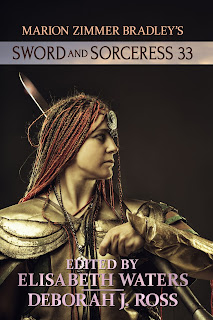Enter a wondrous universe…the latest volume of Sword and Sorceress, featuring stories
from new and seasoned authors. Herein you will find tales of fantasy with
strong female characters, with some version of either martial skill or magic.
Not all the protagonists will be human, and sometimes the magic will take
highly original forms, but the emotional satisfaction in each story and in the
anthology as a whole, remains true to the original vision. The release date will
be November 2, 2018.
Kindle: https://amzn.to/2NitlHH
Deborah J. Ross: Tell us a little about
yourself. How did you come to be a
writer?
Jane Linskold: I’ve been a storyteller
since I was very young, but I didn’t really make any sort of focused effort to
write those stories down until I was a college undergraduate. By the time I finished my PhD, I knew that I
wanted to be a fiction writer.
Therefore, as soon as my dissertation was completed, I put the time I’d
been using to write that into writing fiction.
I had a lot of rejections, but finally started selling.
DJR: What inspired your story in Sword and Sorceress 33?
JL: As far back as I can remember, I’ve
always been interested in the non-human perspective. For various reasons, I found myself
wondering what it would like to be a familiar.
Many Fantasy stories feature familiars, but I couldn’t think of any
where they weren’t either sage advisors, flippant commentators on the action,
or (worst of all) simply another tool in the wizard’s kit. I decided to try my hand at writing a story
from the familiar’s point of view, and this is what resulted. I very much like both the (currently
nameless) familiar and the people it meets.
I definitely plan to write more about them.
DJR: What authors have most influenced your
writing? What about them do you find
inspiring?
JL: That’s pretty tough for me to answer because I’ve read very widely, both in
the SF/F genre and without. The PhD I
mentioned above is in Literature, so I’ve read a lot of mainstream material as
well.
Although there
are many authors whose work I have enjoyed maybe, in the final analysis, the
biggest “influences” have been negative – the writers I have read whose work I
have hated. These are the ones I’ve
spent a lot of time thinking about, trying to assess why my reaction is so
intense. Then, of course, I avoid doing
those things!
DJR: Why do you write what you do, and how does
your work differ from others in your genre?
JL: I write in many voices, each meant to be the
best way to tell that particular story.
So, for example,Asphodel, Smoke and Mirrors, and Through Wolf’s Eyes are all written by
me, but they are not in the least alike.
So I’d say that my work differs from many others in my genre because the
trend seems to be settling on one voice and style, then staying there.
DJR: How does your writing process work?
JL: I’m an intuitive plotter, which
means I don’t outline or plan much more than a scene or so in advance. When writing a novel, sometimes I’ll make
myself notes as I go along, but often I end up changing direction even from
those. I research intensely, sometimes
before, often during, writing a piece.
DJR: What have you written recently? What lies
ahead?
JL: My most recently published novel is the short
surreal Fantasy, Asphodel. Recent short fiction publications include
“Unexpected Flowers” in Asimov’s and
“A Green Moon Problem” in Lightspeed.
I’m currently
working on the first Firekeeper novel in about ten years. I also have some short stories gnawing at the
corners of my subconscious that I hope to squeeze in.
DJR: What advice would you give an aspiring writer?
JL: On the creative side, persist. Listen to what other people say about their
creative process, but realize there is no one-size-fits-all answer and search
for your own. My book Wanderings on Writing is intended as a
sort of craft box through which you can burrow, taking what is of use to you
and discarding the rest.
On the business
side, please note, it’s harder than ever to make a living as a full-time
author, so be prepared to have a day job.
Try not to have that day job involve writing. Most people have only so much writing in them
per day. If you use that all as a
journalist or professional blogger or whatever, you may find yourself dry by
the end of the day when you sit down to write fiction.
If you’re not yet
through college, don’t major in Creative Writing unless you either want to
teach creative writing or plan to write literary fiction. If possible take a few business electives,
especially one dealing running a small business and/or contracts. If you feel a real need to study the craft of
writing SF/F, consider one of the specialized workshops. However, it’s possible to be a professional
without ever attending one of workshops – I never did and
here I am.
When she is not
writing, Jane delights in doing the impossible, including herding cats,
wrangling guinea pigs, and tending a garden in the desert. You can learn more
about her works, as well as find links to her social media, at www.janelindskold.com.

No comments:
Post a Comment